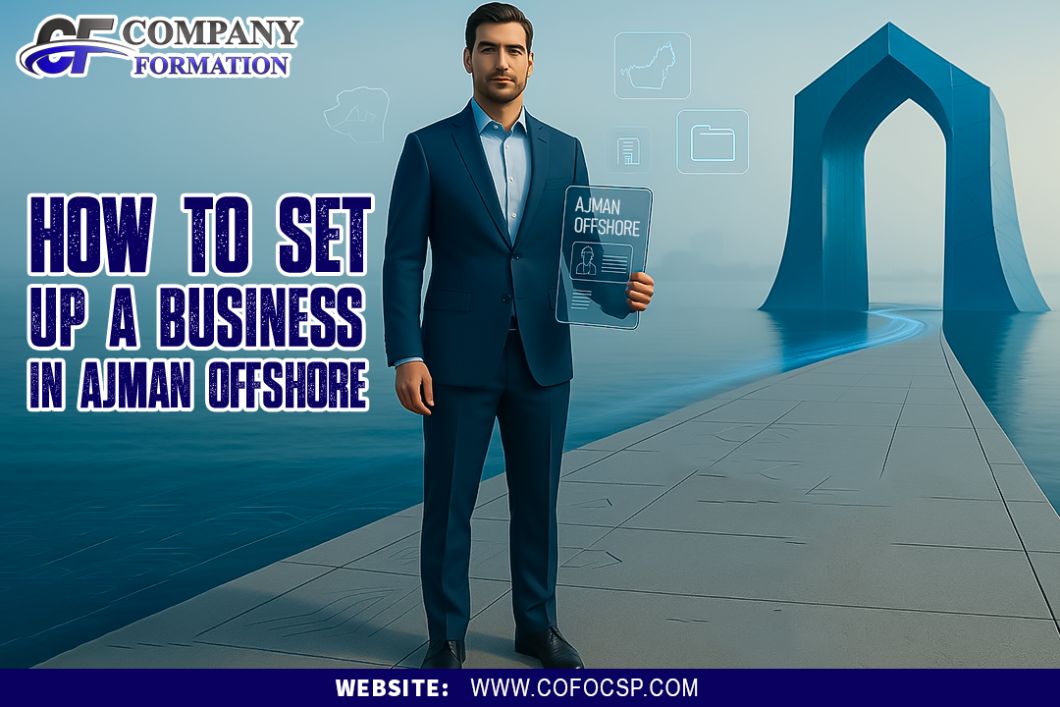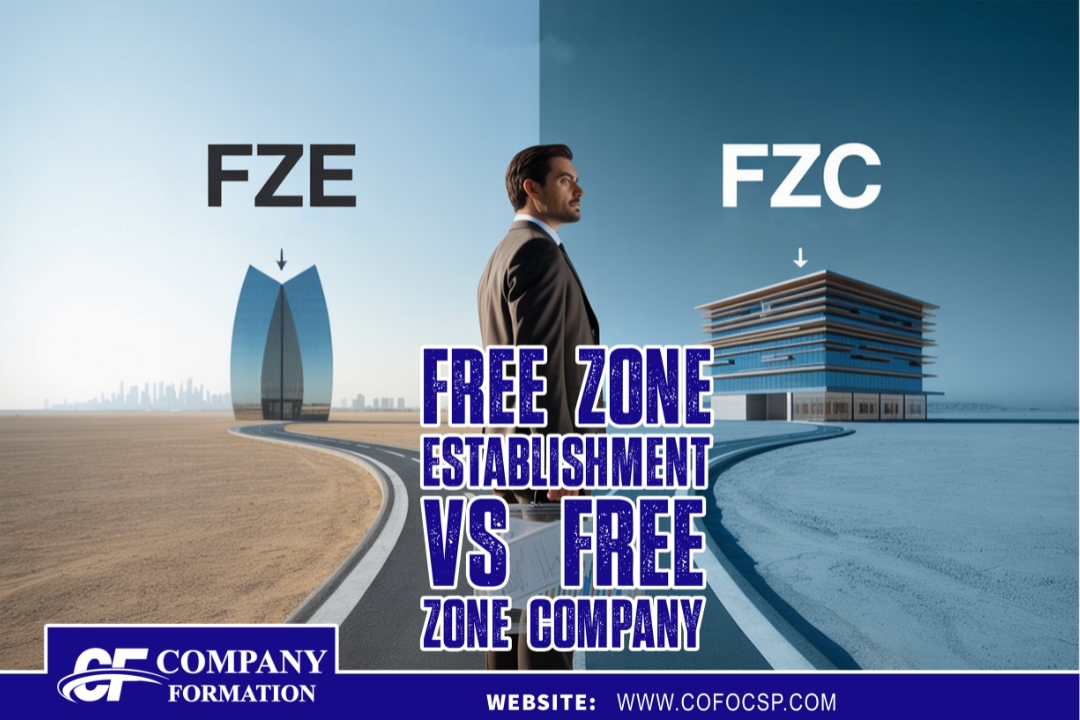Ajman Offshore Company formation
To set up an Ajman offshore company, pick a trade name ending in “Limited,” appoint a registered agent, submit documents like passport copies and a CV, notarize your Memorandum and Articles of Association (MoA & AoA), and open a corporate bank account. Costs start at AED 8,999, with zero taxes, no audit requirements, and shareholder confidentiality. It takes 2-3 days, but you can’t operate in the UAE or get a residence visa. Ideal for asset protection and international expansion.
How to Set Up a Business in Ajman Offshore
Starting an offshore company in Ajman is as straightforward as it sounds. The Ajman Free Zone still rolls out tax exemptions and grants full foreign ownership, allowing founders to keep complete control. There is no mandated minimum capital, and the paperwork typically clears in two or three working days. Because privacy is built into the framework, directors’ names do not appear in public registries. Global banking relationships open quickly once company formation is confirmed. Profits can be repatriated without penalty, and registered businesses can operate under a virtual office address within the UAE. Because rules change regularly, anyone considering this route should review the latest fee schedules and compliance checklists before proceeding.
What Is an Ajman Offshore Company and Why Choose It?
An Ajman offshore company, also called an International Business Company, is a business registered with the Ajman Free Zone Authority (AFZA) for global operations outside the UAE. The entry price is noticeably lower than in many other emirates, so cash-strapped startups find the zone agreeable. One acquaintance of mine who later opened a general trading enterprise still speaks favorably of the approach.
Established in 1988 by Emiri Decree, the Free Zone has expanded steadily; official data cites a recent 45-percent uptick in consultancy and investment activities. Jurists regard the zone legal framework as modern and compliant with prevailing international benchmarks, a fact that reassures foreign partners.
Company formation in Dubai regularly generates headlines for its price tag-gold-plated address platinum expenses. Ajman counters with a budget-friendly alternative, offering incorporation packages that seldom hit four digits and a virtual-office solution that sidesteps the need for bricks-and-mortar leases. No declared minimum capital sits below the radar, yet global banks still recognize the jurisdiction, allowing clients to open accounts without the usual hoops. Even seasoned advisors pause and ask: what about Ajman?
How Does Ajman Free Zone Support Business Ecosystem?
Its free zone-first granted no-strings autonomy via Emiri Decree No. 3 of 1996-is both orderly and urgent in that rare way offshore centers must be. One client of mine pinged me on a
Monday; by Wednesday, his consulting firm was active, and the virtual office stapled onto the license saved him the hassle of signing a long lease. Situated minutes from Ajman Port and a leisurely drive from the runways at Dubai and Sharjah, the enclave costs importers next to nothing in internal transport. If you are chasing rapid turnarounds and easy customs lanes, you quickly learn to answer that earlier question with a single word: Ajman.
Why Is Ajman a Cost-Effective Emirate for Offshore Setup?
Ajman often trends at the bottom of regional price lists because the basic free-zone package begins around AED 8,999, a figure that only creeps upward if you add extra visas or quick license renewals. In contrast, Dubai’s standard business tariff can easily exceed AED 12,500 the moment you tick the shared-desk box. The authorities here also waive the usual minimum paid-in capital rule, letting founders declare a token sum such as AED 10,000 in the Memorandum and Articles of Association.
A colleague who later launched a shipping management firm told me that the short run from their office to Ajman Port sliced his logistics bill in half. Full foreign ownership sits alongside unrestricted profit repatriation, so every dirham you make leaves the country as yours and yours alone.
Key Benefits of Setting Up an Ajman Offshore Business
Setting up a company in Ajman offshore feels almost too smooth for most expats who land it. Colleagues and clients often mention the speed of registration and the relatively light paperwork that follows. In practical terms, that speed translates into saved weeks and, sometimes, lost business opportunities avoided.
What Makes the Tax-Free Environment So Attractive?
Tax-free environments have a way of catching the eye, and Ajman fits that mold. The Emirates introduced a 9 percent corporate tax in early 2023, yet offshore firms that do not touch the local market slip through the net entirely. One general trader I work with recycled what would have been tax dollars back into stock, and his lean operation doubled output before the year was out. Few other jurisdictions can claim the same wide-open window. A client who runs an e-commerce platform expressed genuine disbelief when he filed zero tax returns last April.
How Does Enhanced Privacy Safeguard Your Assets?
Privacy, not secrecy, is the pitch here, and it lands well. Shareholder particulars stay off the public rolodex, creating quiet distance from opportunistic litigants. An investment manager I guided through formation talked at length about the peace of mind that comes with knowing his residential address never appears on a government ledger.
Other benefits include:
- 100% foreign ownership: No local sponsor needed.
- No minimum capital: Start with any amount; no deposit is required.
- Global banking access: Open a UAE bank account or international accounts for multiple currencies.
- Virtual office UAE: No need for a physical office, saving on cost-effective leasing.
- Property ownership: Own up to three properties in Ajman for real estate investment.
- Fast setup: Business registration in 2-3 days.
- No audit requirements: Minimal reporting keeps costs low.
Permitted and Restricted Activities for Ajman Offshore Companies
Set up an Ajman offshore firm, and you quickly appreciate its flexible profile, yet the charter is anything but vague. The classic offshore blend-smooth trading, low footprint, manageable costs with a big red no when it faces the UAE mainland market. More than once, I’ve sat with founders, pencil in hand, deciding where the lines really are. Those conversations sound dry on paper, but they matter deeply once real money is on the table.
Which Business Activities Thrive in Ajman Offshore?
Activities allowed include:
- General Trading: Handle import, export, or re-export commodities like textiles or electronics.
- Professional services: Offer consulting services, accounting services, or legal advice.
- Stakeholding: Hold shares in UAE or international companies.
- Investment ventures: Engage in stock investment, bond investment, or real estate investment.
- International services: Provide advisory services or international service operations.
- Shipping management: Register ships or manage shipping and ship management.
- Brokerage activities: Act as intermediary brokers or commission agents.
- Property holding: Own up to three properties in Ajman.
- Online advertising: Run online advertising activities globally.
- Intellectual property rights holding: Manage patents or copyrights.
A friend used Ajman for general trading, exporting goods to Asia. The Ajman Port made logistics easy, and he didn’t need a physical office, thanks to the virtual office in UAE.
What Activities Are Not Allowed?
Activities not permitted include:
- Financial services, insurance, reinsurance, media, or aviation.
- Business with onshore companies in the UAE.
- Establishing a branch or leasing office space in the UAE.
- Hiring employees or sponsoring UAE residence visas.
I once advised a client against pursuing financial advisory in Ajman offshore due to restrictions. He switched to consultancy and thrived.
Requirements for Ajman Offshore Company Formation
The Ajman offshore company formation process is simple but has specific offshore regulations. I’ve helped clients breeze through this, and here’s what you need.
Who Can Be Shareholders, Directors, or Secretaries?
You need:
- One shareholder Can be an individual or corporate shareholder.
- Two directors: They must be individuals, not companies.
- One secretary: Can double as a director for a dual role.
- Shareholder-director overlap: One person can fill both roles.
There’s no limitation on nationality, so anyone worldwide can participate. I assisted a client who was the sole shareholder and director, making his company setup super efficient.
Why Is a Registered Agent Essential?
A registered agent is required by the Ajman Free Zone Authority. They manage AFZA communications, provide a premium address (e.g., Business Bay Dubai), and act as your registered address in the UAE. Since no physical office is needed, their office covers this. My client’s agent handled all the paperwork, saving him days of stress.
Other requirements:
- Physical or notarized signing: Sign documents before AFZA or remotely with notarization.
- Capital structure: No minimum paid-up capital; set any amount in the MoA & AoA.
- Property limit: Up to three properties in Ajman.
- No UAE residence visa: Offshore companies can’t sponsor visas.
- Business scope: Limited to free zone and international activities.
Step-by-Step Guide to Ajman Offshore Business Setup
Here’s a detailed guide to set up your Ajman offshore company. I’ve walked clients through this, and it’s fast—usually 2-3 days.
1. How to Choose a Compliant Trade Name?
Pick a trade name ending in “Limited” or “Ltd.” Avoid restricted words like “Dubai,” “Bank,” or “Emirates.” Submit three name options to AFZA for approval. Define your business activities (e.g., general trading, stakeholding). I helped a client choose “TradeWave Limited” for his import-export business, and it was approved in 24 hours.
2. What Documents Should You Prepare?
Gather these documents:
- Shareholder passports (valid copies).
- UAE entry stamp page or valid UAE visas.
- Proof of residency (e.g., utility bill).
- Curriculum Vitae (CV) for each shareholder.
- Bank reference letter or certificate of good standing.
- Memorandum and Articles of Association (MoA & AoA).
For corporate shareholders, add:
- Certificate of Incorporation.
- MoA & AoA.
- Board Resolution for the setup.
- Certificate of Good Standing.
- Two directors’ passport copies.
A business setup consultant in Dubai I worked with ensured my client’s documents were perfect, speeding up approval.
3. How to Finalize Your Legal Documents?
Prepare and notarize your MoA & AoA, translating them into Arabic if required. Sign them before AFZA or remotely via a notary. This locks in your company formation legally. I’ve seen clients skip notarization and face delays, so don’t cut corners here.
4. How to Open a Corporate Bank Account?
Open a UAE bank account with banks like Emirates NBD, Mashreq Bank, RAK Bank, Emirates Islamic, Dubai Islamic Bank, or ADIB Bank. Alternatively, choose an international bank for global transactions. Submit your certificate of incorporation, MoA & AoA, and shareholder documents. This takes 5-15 days. My client’s business setup consultant negotiated with Mashreq Bank to fast-track his account.
5. How to Complete Your Company Registration?
Pay the registration fee (AED 8,999+) and submit all documents to AFZA. You’ll receive your certificate of incorporation, share certificate, and company stamp. Optional extras like company letterhead or a premier service agent can be added. My friend’s investment company was registered in two days, and he was ready to trade globally.
Costs of Ajman Offshore Setup in 2025
The Ajman offshore company setup cost in 2025 is budget-friendly, starting at AED 8,999. Compared to a business setup in Dubai (AED 12,500+), it’s a steal. Here’s a detailed breakdown based on my experience and 2025 projections.
What Are the Initial Setup Costs?
- Registration fee: AED 5,000–7,000 (government fee).
- Registered agent fee: AED 2,000–3,000 (annual).
- Document preparation: AED 1,000–2,000 (notarization, translations).
- Bank account opening: AED 500–1,500 (bank fees).
- Optional services: Company stamp (AED 200), company letterhead (AED 300).
Packages include:
- Basic (AED 8,999): Certificate of incorporation, MoA & AoA, trade name certificate.
- Standard (AED 9,999): Adds share certificate bank account assistance.
- Premium (AED 10,999): Includes company stamp, premier service agent, and company secretarial services.
How Much Are Renewal Fees?
Ajman offshore renewal fees are AED 4,999 annually, covering government and agent fees. No annual ESR filing is needed for most activities, unlike JAFZA. I advise clients to budget for renewals to avoid surprises.
Compliance and Regulations for Ajman Offshore Companies
Ajman offshore companies enjoy minimal reporting, making compliance easy. I’ve helped clients stay on track, and here’s what you need to know.
What Are the Economic Substance Regulations (ESR) Requirements?
In 2025, most Ajman offshore companies are exempt from Economic Substance Regulations (ESR) since they don’t operate in the UAE. However, activities like financial advisory or commodity trading may require annual ESR filing. Check with a business setup consultant in UAE to confirm. My client avoided ESR for his consultancy business, saving time and costs.
Do You Need Accounting or Audits?
There are no accounting requirements or annual audits for Ajman offshore companies. You must keep basic transaction records internally, but nothing needs to be submitted to AFZA. This low tax responsibilities setup is a big draw for clients I’ve worked with.
How to Leverage Business Setup Consultants and PRO Services
A business setup consultant in UAE can streamline yourAjman offshore company formation. They’re worth their weight in gold for navigating UAE business laws and offshore regulations.
What Do Business Setup Consultants Offer?
Consultants handle:
- Trade name approval and business registration.
- Document preparation and notarization.
- Bank account setup with global banking access.
- Compliance with Ajman Free Zone Authority.
I worked with a business setup consultant in Dubai who saved my client hours by managing his certificate of good standing and MoA & AoA translations.
How Do PRO Services Simplify Your Setup?
PRO services tackle legal tasks like:
- Document notarization and translations.
- AFZA submissions and follow-ups.
- Visa or permit coordination (if needed elsewhere).
My client’s PRO services ensured his trade name certificate was approved quickly, letting him focus on his general trading business.
Ajman Offshore vs. Other UAE Offshore Zones: A Deep Dive
Wondering how Ajman offshore compares to RAK ICC and JAFZA? I’ve analyzed this for clients, and here’s a detailed breakdown.
How Does Ajman Compare to RAK ICC?
- Cost: Ajman starts at AED 8,999; RAK ICC at AED 7,500.
- Setup Time: Ajman is faster (1-2 days vs. 2-3 days).
- Property Ownership: Ajman allows up to three properties; RAK ICC is limited.
- Best For: Ajman suits general trading and consultancy; RAK ICC excels in holding company functions.
A client chose Ajman over RAK ICC for its Ajman Port proximity, which is perfect for his shipping management business.
What Sets Ajman Apart from JAFZA?
- Cost: Ajman is cheaper (AED 8,999 vs. AED 12,500).
- Physical Office: Ajman requires none; JAFZA offers optional offices.
- Bank Accounts: Both offer UAE bank accounts, but JAFZA has more international options.
- Best For: JAFZA is ideal for large-scale international trade; Ajman for startups and SMEs.
JAFZA’s Dubai proximity is great, but Ajman’s cost-effective free zone won over my client for his investment company.
FAQs: Everything You Need to Know About Ajman Offshore Setup
Q1: What is the cost of Ajman offshore company setup in 2025?
Starts at AED 8,999, including government fees. Renewal fees are AED 4,999, with bank account fees of AED 500–1,500.
Q2: How does Ajman offshore compare to RAK ICC and JAFZA?
Ajman offers lower costs, faster setup, and property ownership. RAK ICC is better for holding company functions; JAFZA is for large international trade.
Q3: Can I get a UAE residence visa with an Ajman offshore company?
No, offshore companies can’t sponsor UAE residence visas. Consider mainland or free zone setups for visas.
Q4: What activities are permitted in Ajman offshore?
General trading, consulting services, stakeholding, investment ventures, shipping management, and property holding (up to three properties).
Q5: What are the compliance requirements in 2025?
You need a registered agent, basic record-keeping, and adherence to offshore regulations. Most skip annual ESR filing and audits.
Conclusion: Start Your Ajman Offshore Journey Today
Setting up in Ajman offshore opens the door to low-cost international expansion. The jurisdiction pairs tax exemption with full foreign ownership, and formation packages start as low as AED 8,999; that range suits outlets from general trading to consultancy and pure investment. Paperwork moves surprisingly fast, typically clearing in just two or three days; there is no minimum capital requirement, and shareholder identities remain private. While the structure prohibits onshore activity and does not come with a residency visa, easy banking access and the port proximity still offer a tangible operational edge. Most founders enlist a local business consultant or PRO services to handle the details, and that partnership usually makes the process painless. If you are ready to move, your next trading hub is already waiting.






